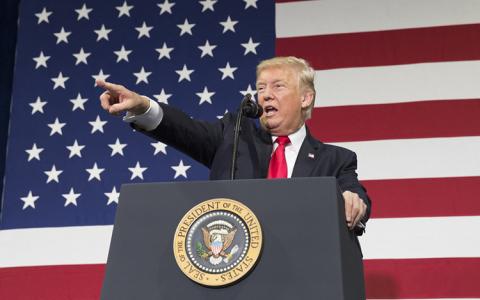
Blockchain technology just helped Utah and Arizona select the delegates who will nominate President Donald Trump for his re-election bid in 2020 at the Quadrennial National Convention in August. West Virginia used the same company to count the votes of military service members based overseas for the 2018 midterm elections. However, West Virginia declined to use the same company this year based on a report from MIT showing how votes could be altered and privacy violated.
Ronna Romney McDaniel, chair of the Republican National Committee, has made it clear today there will not be a virtual National Convention in August, a similar message that has been relayed over the last week, making the decision to use a controversial voting application academic. Voatz, the company, has blasted back at the report issued by MIT, claiming it is false.
The fact that this technology is playing a role in determining which delegates go to the convention highlights how the Trump Administration has generally been silent on a technology that the rest of the world has been embracing. China’s President Xi Jinping has stated, “Blockchain is ten times as important as the Internet,” and the country recently formed a foundation for infrastructure of blockchain technology. The “Blockchain Service Network” is an open-source protocol to provide a national network for blockchain as a service.
Trump has commented on Bitcoin and Facebook’s Libra Project on Twitter last year; however his focus took aim at cryptocurrencies only, claiming their value was contrived out of ‘thin air’. However blockchain, the technology underlying Bitcoin, has largely become transformed over the last decade into enterprise applications due to its strong security as well as its transparency.
MIT news in February noted two main issues with the voting application used. The report, “...uncovered security vulnerabilities in a mobile voting application that was used during the 2018 midterm elections in West Virginia. Their security analysis...pinpoints a number of weaknesses, including the opportunity for hackers to alter, stop, or expose how an individual user has voted.” In addition, the report described privacy issues, noting “...the researchers found that Voatz’s use of a third-party vendor for voter identification and verification poses potential privacy issues for users.”
MIT NEWSMIT researchers identify security vulnerabilities in voting app
Before making their findings public, the MIT researchers reached out to the Department of Homeland Security’s Cybersecurity and Infrastructure Agency (CISA). Daniel Weitzner, a principal research scientist at MIT’s Computer Science and Artificial Intelligence Lab (CSAIL) stated, “ We cannot experiment on our democracy...The consensus of security experts is that running a secure election over the internet is not possible today.”
The Vote On Voatz Disputed
Voatz is a Boston-based mobile voting platform. “Blockchain technology, when used for financial transactions like Bitcoin, cannot be totally anonymous (rendering the term “pseudonymous”), however, when used in voting with the Voatz application, the identity of the voter is doubly anonymized: first by the smartphone, and second by the blockchain server network.”
Voatz disputes the findings in the MIT report. While the technology and coding used is not made public, Voatz uses a permissioned blockchain called Hyperledger, a protocol developed with the strong support of IBM IBM. Hyperledger is known for strong privacy policies and is used across many private enterprises as well.
More than 1,100 delegates voted using the Voatz app on May 9 in Arizona, with a nearly even split of voters using iPhones (58.3%) and Androids (41.7%). Voatz’s blockchain ledger is distributed across multiple, geographically-separated servers. These servers are called “verifiers” because their function is to verify the authenticity of the blocks (i.e. collection of votes) containing anonymous votes before they are added to the blockchain. Once a block is verified and added to the collection of previous blocks — the blockchain — the votes are copied to each verifying server and cannot be changed.
The Cambridge Analytica Dilemna
The events in this past year’s Iowa Caucus, which were an unmitigated disaster, certainly shed light on the idea of experimenting with democracy using emerging technologies. Were it not for COVID-19, states like Utah and Arizona probably would not even be thinking about remote voting. However, Voatz had been tested and has shown resilience in the face of the initial problems noted in 2018.
The question for the Trump campaign and both parties in the upcoming election may be less about the technology used and more about how to trust a private company to certify election results and provide fairness and transparency. For those who remember the Cambridge Analytica issues of scraping data from users and Facebook, the question also exists for companies such as Voatz as to how they lock down their data to avoid another company pulling data illegally to influence the 2020 election.
For now, it appears Arizona is satisfied with the results and the Voatz Co-Founder and CEO, Nimit Sawhney, commented, "This is a critical moment for our democracy, and we have to ensure that we have safe alternatives to voting in person. Voatz is proud to be able to meet this need and to ensure the safety and health of its voters." Republican Party of Arizona Executive Director Greg Safsten said "Voatz was a great partner in fulfilling our goal of being minimally disruptive to our convention procedures. After a careful vetting process, we were confident in Voatz's ability to support secure and private voting with the added benefit of an immediate confirmation that each delegate's vote counted.”
Using blockchain for trust in exercising the most fundamental rights of our country is a very positive thing for those that believe and understand how the technology creates trust. However, with the belief of the industry in this new technology, there is the court of public opinion that will ultimately judge its capabilities on the national stage.
This article originally appeared on Forbes.



